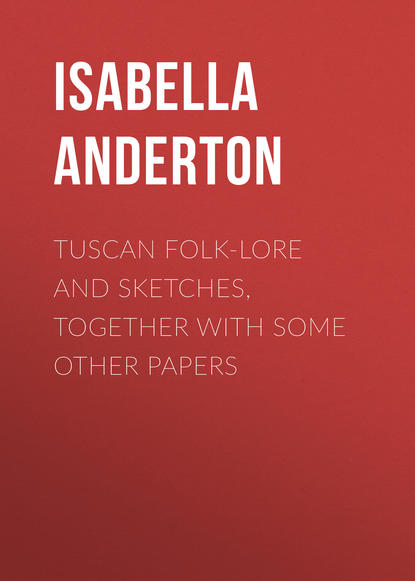По всем вопросам обращайтесь на: info@litportal.ru
(©) 2003-2024.
✖
Tuscan folk-lore and sketches, together with some other papers
Настройки чтения
Размер шрифта
Высота строк
Поля
notes
1
This is actually as the woman told it. I can only suggest there is some lacuna which my story-teller did not know how to fill up.
2
We retain the unusual spelling “Dominiddio,” which is evidently intended to indicate the pronunciation of the Tuscan peasants.– Ed.
3
Cf. The Story of The Three Sisters, in the Arabian Nights.
4
“Let us go, young men; let us go, young men, to those nice cialde, O – h.”
5
Beppe’s home is more fully described in “A Tuscan Farmhouse,” .
6
The house is small, but great its restfulness.
7
Sacred to Jupiter, the patron of hospitality. Oh, thou, whoever thou mayst be, who, being an honest man, art perchance fleeing those worst of enemies, thy neighbours, enter this lonely house and rest.
8
Friends, enemies;
Relations, serpents;
Cousins, assassins;
Brothers, knives.
9
For description of the marriage, see “A Wedding in the Pistoiese,”.
10
That Capoliveri was a Roman town seems to be proved by the manuscript of a Goth, quoted as travelling in these parts in about 530 A.D. He tells us that the right name of the place is Caputliberum, for that Roman exiles deported to this village, without any difficulty, obtained the liberty of walking outside the walls within the jurisdiction of the city. It must have been a sort of Domicilio Coatto. The author of the manuscript is called by Ninci and Lambardi Celeteudo or Celteuso.
11
The copper mines, mentioned by Aristotle, are no longer open. That they were worked by the Etruscans was first proved by Raffaello Foresi, when, in 1865, he made known the discovery of various bronze objects. These were found by one of the Foresi peasants near the entrance into the ancient copper mines above Portoferraio, together with a mould for receiving the melted bronze. Finely-worked bronze ornaments were found about the same time during an investigation made at Foresi’s suggestion, associated in a sepulchral cavern with skulls of Etruscans and Ligurians.
12
“Storia dell’Isola dell’Elba.” Giuseppe Ninci. Portoferraio, 1815.
13
qui in portoferraio
nel MDCCCII fu recato pargoletto
vittore hugo
qui nacque la sua parola
che più tardi lava di fuoco sacro
dovea correre le vene dei popoli
e forse tre anni
vissuti in quest’aura
cui danno atomi il ferro ed il mare
afforzando il corpo infermiccio di lui
serbavano
l’orgoglio dei suoi natali alla francia
la gloria del suo nome al secolo
all’umanita
un apostolo e un genio immortale.
14
napoleon the great
passing by this place in MDCCCXIV.
took in the neighbouring field a ploughshare
from the hands of a peasant
and himself tried to plough but





